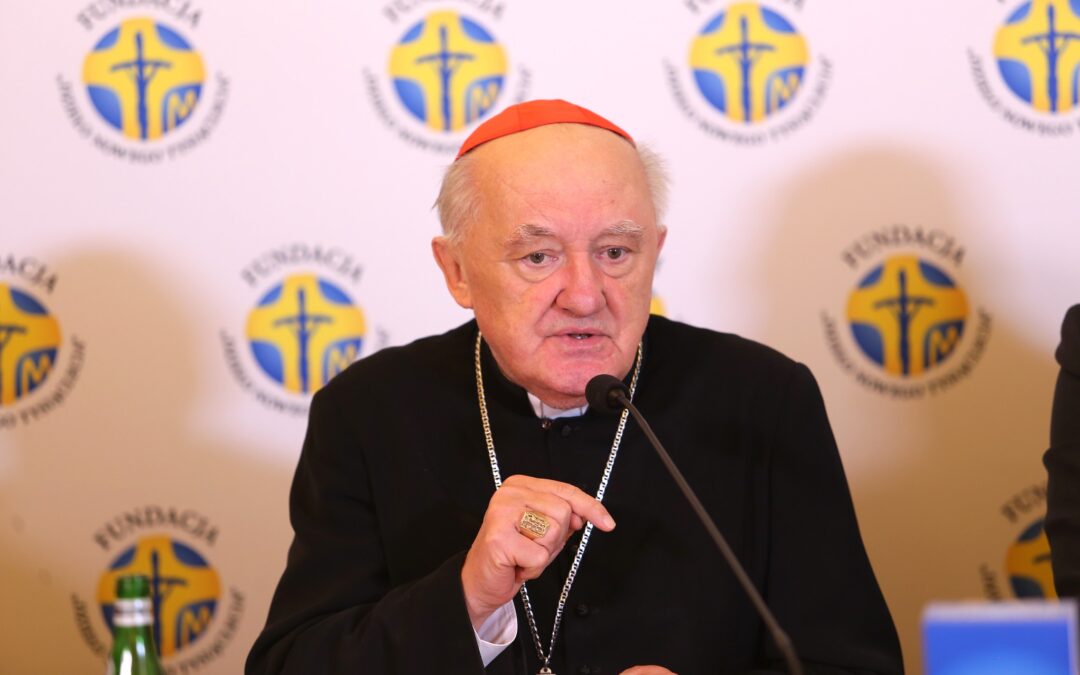One of Poland’s most senior church figures has called for school religion classes – which teach Catholic catechism and are currently optional – to be made compulsory for all students. He says that, “without knowledge of Christianity, it will be difficult for young people to understand the modern world”.
The remarks by Cardinal Kazimierz Nycz, the archbishop of Warsaw, come just days after the education ministry unveiled plans to go in the opposite direction by halving the number of hours that religion classes are taught in schools.
Kard. Nycz: godzina lekcji religii w tygodniu powinna być obowiązkowa#PAPInformacje https://t.co/GteNPG0cFG
— PAP (@PAPinformacje) October 4, 2024
Religion classes are currently funded and hosted by public schools but with teachers and curriculums chosen by the Catholic church. A majority of pupils attend them, though the proportion has been falling in recent years.
There has been intense debate over whether the classes should continue in their current form and how they should be funded. A 2022 poll found that 44% of the public want them removed from schools entirely. Two other polls in 2019 found large majorities in favour of ending public funding for them.
However, speaking to the Polish Press Agency (PAP), Nycz argued that not only should religion classes continue to be held in public schools but that they should be made compulsory for all pupils.
"When someone tries to take religion away from us, they are taking away an inalienable part of Polishness that we can never give up," says President @AndrzejDuda amid efforts by the government to reduce and reorganise Catholic catechism teaching in schools https://t.co/xP7LErNW2e
— Notes from Poland 🇵🇱 (@notesfrompoland) September 2, 2024
“One hour of religion lessons per week should be absolutely obligatory for all students, since we live in a European civilisation,” said the cardinal. “Twenty-seven European countries have understood that religious education is something necessary and needed in schools.”
In many other European countries, such classes consist of teaching about a range of religions and belief systems. However, in Poland they consist largely of Catholic catechism.
“It is impossible to understand European art, music and architecture without knowledge of Christianity,” added Nycz. “Without specific knowledge in this area, it will be difficult for young people to understand the mechanisms that govern the modern world, Europe and Poland.”
Poland’s constitution stipulates that “public authorities shall be impartial in matters of personal conviction, whether religious or philosophical”, and that “parents shall have the right to ensure their children a moral and religious upbringing and teaching in accordance with their convictions”.
Sorry to interrupt your reading. The article continues below.

Notes from Poland is run by a small editorial team and published by an independent, non-profit foundation that is funded through donations from our readers. We cannot do what we do without your support.
The cardinal’s remarks come after the education ministry published on Tuesday this week a draft regulation that would, from the beginning of the next school year, halve the number of hours that optional religion and ethics classes are taught from two hours a week to one.
It would also require that those classes are taught either at the start or end of the school day, to avoid the situation whereby pupils who do not take them end up having gaps in their timetable in the middle of the day.
Commenting on the proposed changes, education minister Barbara Nowacka said that, “if a child has more religion than biology, chemistry, geography combined [as is currently the case], then something in the educational process is going wrong”.
“If there are people, and there certainly are, for whom this religious education is important, there is nothing to prevent additional hours from being implemented as part of additional classes,” she added, quoted by the Rzeczpospolita daily.
At school, children spend the most hours learning:
1. Polish (950)
2. Maths (760)
3. PE (760)
4. Foreign languages (722)
5. Religion (608) (optional)
6. History (342)
7. IT, geography, biology (190)
8. Chemistry, physics, music, art (152)Via @konkret24: https://t.co/00bykGGuS9 pic.twitter.com/WqmthZtBlE
— Notes from Poland 🇵🇱 (@notesfrompoland) November 28, 2019
Poland’s previous national-conservative Law and Justice (PiS) government, which ruled from 2015 to 2023, was a strong supporter of the church and of teaching religion in schools. It wanted to make it compulsory for all pupils to take either religion or ethics classes.
In 2021, the PiS education minister, Przemysław Czarnek, said that it is vital for Polish children to receive a Christian education so that they can “save Latin civilisation in Europe and the world”.
However, the new, more liberal ruling coalition that replaced PiS in office last December has been moving in the opposite direction, seeking to diminish the importance of religion in schools.
It has already removed grades received in the classes from students’ end-of-year averages and allowed schools to create religion classes composed of pupils from different year groups, rather than from single cohorts as was previously the case. Those changes have been met with criticism from the church.
The constitutional court has ordered a halt to planned changes by the government to the organisation of school religion classes.
The measure was requested by Christian churches and is in place until the court issues a ruling on the legality of the changes https://t.co/ASP8TLIbtb
— Notes from Poland 🇵🇱 (@notesfrompoland) August 30, 2024
Main image credit: BP KEP/Flickr (under CC BY-NC-SA 2.0)

Daniel Tilles is editor-in-chief of Notes from Poland. He has written on Polish affairs for a wide range of publications, including Foreign Policy, POLITICO Europe, EUobserver and Dziennik Gazeta Prawna.



















